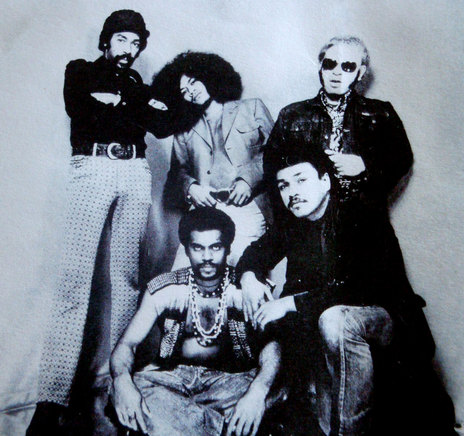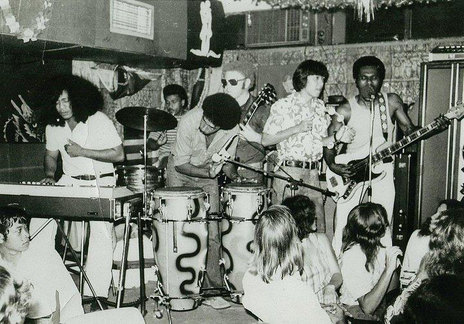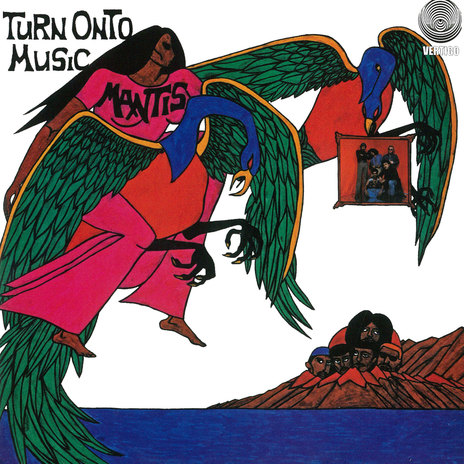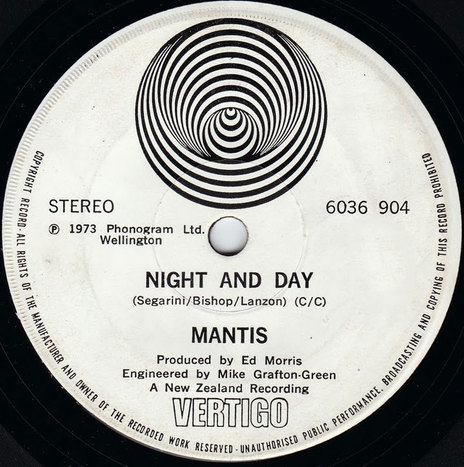AudioCulture
The noisy library of New Zealand music
Te pātaka korihi o ngā puoro o Aotearoa
Mantis
The origins of the band go back to the late 1960s and the nightclub scene in Suva. With more relaxed licensing laws than New Zealand at the time, live music thrived almost every night of the week in Suva’s nightclubs. All the clubs had their own house bands that played three or four sets a night.
Former Fijian journalist and senior reporter/director at TVNZ for Asia Downunder, Bharat Jamnadas: “At the time there were four or five nightclubs in Suva and a lot of really good bands playing in them ... the audiences were a great mix of locals, expats, tourists and often seamen and people working on visiting cruise ships.”
The Fijian capital’s first and most popular nightclub was the Golden Dragon. Its resident band was the Dragon Swingers. They proved a fertile breeding ground over the years for some of the country’s finest musicians, including jazz guitarist Tom Mawi. Among them in the early 1970s was another brilliant guitarist and the band’s musical leader, Waisea “Wise” Vatuwaqa, lead singer Ken Janson, bassist Joe Heritage, keyboardist Ronnie “Paspatu” Sammuel, drummer Paul Stephen and his cousin, percussionist Rupeni Davui.
The band practised at midday each day before playing most nights of the week at the Dragon. Janson also ran a musical instruments shop, giving them access to equipment plus overseas rock, funk and soul records that they would learn and play at the club. Local radio was dominated at the time by country and western, so it was often the first time local audiences at the Dragon were exposed to new music, like Santana, which the band regularly played.
“The Dragon Swingers were naturally talented," says Jamnadas. "None of them were traditionally taught, all played by ear. Because they were such strong musicians they could improvise a lot and were very popular. Although there were many great musicians that played at the nightclub, they were the most memorable and well loved.”
One night at the Dragon an unusual offer was made to the band’s bassist by a group in the audience who were filming in Suva at the time. Among them were Bill Benn and Patrick McKenna.
Passports and visas to New Zealand were quickly organised because they were due to fly to Wellington a week later.
Heritage: “There was a group of people who were part of a film crew that were at the Dragon who approached me during a break and asked if I’d like to be interested in a small part of a movie they were making and if I could come to their shoot the next day.”
The rest of the band supported Heritage at the film shoot the following day and in four or five takes his minor film debut was over. The same group of people from the film crew came to the Dragon again that night. Bill Benn went up to Heritage afterwards and asked if the band would like to go to Wellington. He asked for the full names of the members of the band so he could send tickets. Although the others didn’t believe the offer, Heritage provided the names to Benn. Two weeks later, having completely forgotten about the offer, Heritage received the tickets in the post. Although there was no offer or guarantee of work, most of the band was interested in going, except for Janson. The only band member who was not a full time musician, he had commitments with his shop in Suva.
Passports and visas to New Zealand were quickly organised because they were due to fly to Wellington a week later. The band’s sudden departure from Suva was so fast that it took many by surprise.
“When they went to Wellington it seemed like they disappeared overnight,” says Jamnadas. “They obviously had some connections in New Zealand but no one knew where or why they had gone at the time.”
The band arrived in Wellington at Patrick McKenna’s Brooklyn flat in early 1973. Living there were a range of people involved in the local music scene, including freelance producer Eddie O’Strange. After a morning recording session at EMI Studios, O’Strange, who hadn’t been told anything about the band’s arrival, returned to his flat and was in for a surprise.
“After walking down the path to my flat I noticed these Pacific Islanders in the backyard,” says O’Strange. “I had no idea who they were, where they came from or why they were there. They were literally just sitting on my back door.”
After the initial confusion, more suitable places to stay were organised some through connections within the Wellington Fijian community in Island Bay, some with O’Strange's friends. Having settled, the band began looking for places to play in the city.
Heritage: “In Courtenay Place at the time there were a lot of clubs and pubs. We auditioned in one club for half an hour and although they got paid they didn’t end up playing there.”
Now called Mantis, the band quickly secured gigs at a range of Wellington clubs, including Ali Baba’s on Cuba Street and Ziggy’s on Jervois Quay.
Now called Mantis, the band quickly secured gigs at a range of Wellington clubs, including Ali Baba’s on Cuba Street and Ziggy’s on Jervois Quay. Ali Baba’s was the band’s first experience of playing on a proper stage with lighting. They also played at a graduation at Victoria University and at a fundraising event at the Wellington Town Hall to replace band equipment following a fire at Ziggy’s.
Because they were such good musicians, O’Strange used members of the band as backing players for a range of recordings he produced at EMI Studios, including with folk musician Brent Parlane. Mantis got their first opportunity to record as a unit with O’Strange straight after another session, taking their chance when everything was in place and it could be done quickly and inexpensively. They recorded an up-tempo version of Booker T and the MG’s’ ‘Time Is Tight’ in one take.
“This is how good they were … no other band in Wellington could do that,” says O’Strange.
With the help of O’Strange, the band was soon signed by Phonogram. More studio time was booked and The Wackers’ ‘Night And Day’ was recorded with Heritage on lead vocals. Soon after, ‘Night And Day’ b/w ‘Time Is Tight’ was released as a single on Vertigo.
In his regular column in the NZ Listener at the time, Ray Columbus wrote, “Mantis, the Fijian rock group from the Golden Dragon in Suva have made lots of new fans in the capital with their Santana-style music played by guest musicians. Now Phonograph have signed them up and released a 45 called ‘Time is Tight’ b/w ‘Day and Night’. I hope it gets the chance to do well for them.”
Within days of recording the single, the band was in the studio again to record an album. Material for the album was selected by the band, drawing on their live sets, with O’Strange helping to choose the final list. Because the band knew the material so well, many of the songs were captured on their first take.
“Because they were such good musicians and such a tight band,” says O’Strange, “it was a very easy experience to record them.”
Amazingly, the album, Turn Onto Music, was recorded and mixed within a couple of weeks.
Amazingly, the album, Turn Onto Music, was recorded and mixed within a couple of weeks. Released on the Vertigo label, the album kicks off with the band’s funked-up, slightly less polished version of their single ‘Day And Night’. This is followed by a relatively straight take on Wilson Pickett’s ‘In The Midnight Hour’ with a brilliant walking bass line. The momentum picks up after ‘You Don’t Love Me’ with a rollicking Hendrix-like take on Mountain’s ‘Mississippi Queen’ and Jo Jo Gunne’s ‘Shake The Fat’, complete with dog sounds.
The second half of the album starts with a rush on ‘Turn Onto Music’, which sounds like a lost upbeat Sly and the Family Stone classic. But as good as the album is up to that point, the highlight comes with the instrumental finale, ‘Island Suite’. Although the beginning was rehearsed, the remainder of the three-part suite was totally ad-libbed by the band in the studio with nothing written beforehand and no editing after the three pieces had been recorded separately.
The epic instrumental was a collaborative effort. O’Strange provided the starting point for each of the separate parts, derived from riffs the band played as part of their warmup jams in the studio. He also provided the direction for each part, conceiving atmospheric soundscapes portraying the band's country of origin, shaping each part like a conductor and connecting each through sound bites and effects. The instrumental was also a practical solution to the band running out of time in the studio to record more songs.
Although they were playing and recording and getting regular wages, some in the band who had left wives and loved ones in Fiji were getting homesick. So they returned to Fiji less than six months after arriving in Wellington, shortly after the recording of the album and following the end of their visa extension. This essentially saw the end of the band with the various members going their separate ways. Beyond Mantis, all continued to play music and most were involved in other groups that performed for many years in Fiji, in the process influencing many local musicians.
All continued to play music and most were involved in other groups that performed for many years in Fiji.
After returning to Fiji from time spent playing in Vanuatu, Wise made a significant contribution to recording and producing contemporary music (particularly gospel music) in the 1980s. Davui continued to play music in Australia for many years including with pioneering reggae band Un Tabu in the early 1980s. Wise and Stephen have since passed away and the surviving members are based in different countries, with Heritage in Fiji after years in the USA, Sammuel in the USA after time in the UK and Davui residing in Australia.
An official re-release of Turn Onto Music in 2015 saw the limited edition of 300 sell out rather quickly, Even before that, interest in the album had been high (unbeknown to the band’s surviving members) and it has featured on numerous psych-rock and funk blogs from around the globe. Prior to that, there were at least four unofficial versions of the album released since the early 1990s. Fodder for record collectors, even the unofficial vinyl reissues of the album can go for hundreds of dollars, and original copies cost much, much more.
In less than six months Mantis played numerous shows and recorded a groundbreaking album. If they’d stayed in New Zealand or together as a group for longer who knows what might have happened.




Waisea Vatuwaqa - guitar, vocals
Joe Heritage - bass, vocals
Paul Stephen - drums
Ronnie Sammuel - keyboards
Reuben Davui - guitar, vocals
Vertigo
Visit our sister site
NZ On ScreenMade with funding from
NZ On Air